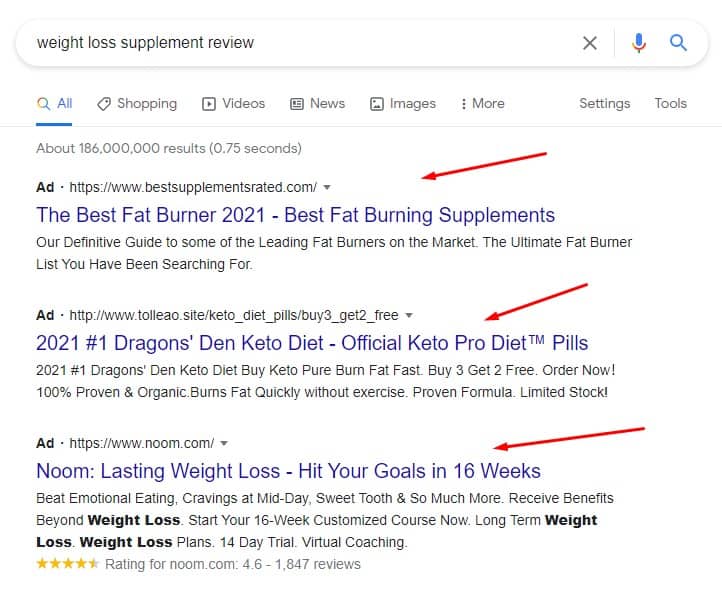There are two main types of online advertising: search and display.
Both have their advantages and disadvantages, but when deciding which type of advertising to use, it’s important to consider why you’re advertising in the first place.
Maybe you’re looking to:
- Build an email list.
- Make a Sale
- Promote an affiliate offer
For most people reading this, it will be a combination of all three.
For the past few years, the question on the minds of many Affiliate marketers has been whether to use display ads or search ads on affiliate marketing websites.
While it is well known that the two types of ads are vastly different in their impact, many people aren’t sure which is best.
For example, how does a display ad differ from a search ad?
And how does each of these in turn differ from an email campaign?
To help you find out, I have collected some of the most commonly asked questions about each type of ad and compared them.
But first, before I get it into that, it’s important to understand the broad scope of paid advertising.
What Is PPC?
PPC is an acronym for Pay Per Click.
It means you’ll only be charged when somebody actually clicks on your ad.
It is not the same as a Pay Per Impression (CPM) model, where you’ll be charged when your ad is seen by somebody, regardless whether they click it or not.
What Is Search Marketing And How Does It Work?
Search Ads are text based Ads that get triggered (shown to a user) when they type in a specific keyword or keyword phrase into a search engine like Google or Microsoft Bing.
The general concept is, you research keywords and identify potentially profitable keywords in your niche and bid on those keywords.
When a user then types that keyword into Google or Bing your Ad is shown to the user and if they click on the ad, you’ll pay for the click.
It can be an extremely profitable method of marketing for affiliate marketers, if you choose the right keywords to target.
What Is Display Marketing And How Does It Work?
Display marketing and Display Ads are very different to Search Ads.
Display Ads are Banner or Image Ads and not Text based.
They are also not triggered by keywords.
Display Ads (banner ads) are targeted to specific websites or categories so that if a user happens to be on a certain website, your ad will show up on that website and if they click it, you’ll be charged.
Banner Ads can also be set up on a CPM basis.
By the way, the most popular bid strategies are CPM and CPC.
CPM is known as Cost Per Thousand impressions and it’s a bidding model where you would pay every time someone sees your ad, regardless if they click it or not.
Keep in mind that an ‘impression’ is Ad-speak for whenever your ad is shown to a user.
So if someone merely sees your ad, but doesn’t click it, you’ll be charged.
Display Advertising is also referred to as ‘Interruption marketing’ since somebody who see’s your ad hasn’t actually typed in a keyword, they just happened to be browsing a website when they saw your Ad.
So as you can imagine, it’s absolutely crucial that your Ad is closely matched to the website a user is viewing, that’s where market research comes into play and the tool I use to plan all my Ad campaigns and target the right website placements, is called Semrush.
Example of Search Ad

Example of a Display Ad

Advantages of Search Ads
In my opinion, the biggest benefit of Search Advertising, is the nature in which your ad is seen or discovered.
Think about it.
Somebody has a problem or a need that needs to be met and they type in a specific keyword into Google or Bing and your Ad shows up.
Assuming you’ve written a relevant and compelling Ad, that’s a very targeted person to show your ad to.
Search Ads are also Text based Ads which means you can write your ad very closely to the search term somebody searched for.
eg: Assuming you’re promoting a battery reconditioning affiliate product.
Somebody types “Repair my battery” into Google and your Ad shows up for the affiliate product you’re promoting, that’s probably going to be pretty profitibale for you.
Advantages of Display Ads
Display Ads are image Ads, also called Banner Ads.
They are not text based like Search.
Banner Ads are shown to users on certain websites known as placements.
The main advantage of Display Advertising is that generally speaking, it’s often cheaper than conventional keyword based search Ads.
Dsiplay Advertising also have, generally speaking, a broader reach meaning you can generally reach more people.
You can also “say” more with an image than you can with words, as the expression goes “a picture paints a thousand words”.
The thing with Display placements, meaning the websites you target your ad to, can be extremely targeted.
If you’re promoting a bodybuilding Supplement as an affiliate and your image Ad shows up on a Bodybuilding website, you can see how targeted that is and how effective it might be!
Which Is Better?
The correct answer is there is no “one cap that fits all” when it comes to Display Ads or Search Ads.
They both have their benefits and it also depends on what your objective is.
If you just want exposure and eyeballs then go with Display Ads.
If you want a specific outcome or you have a specific objective like a sale or a lead, then Search Ads might be a better option.
In my own affiliate marketing business, I use Search Ads more than I use Display Ads.
How To Decide If You Should Use Search Ads or Display Ads?
When it comes to deciding which one to use, there’s a few things to consider.
The first one is Budget.
What’s your budget?
How much can you afford to spend on Ads?
And secondly…
What’s your skill and knowledge level?
Display Ads Considerations
As a general rule of thumb, Display Ads are generally cheaper than search Ads, but your budget will probably be used up a lot faster than Search Ads. (this article will give you a general idea of cost)
Display Ads are displayed on Websites and if you’re paying on a CPM basis (impressions) it means you’re going to be charged regardless of whether they see your Ad or not.
So you can imagine, if you’re advertising on a high traffic website, your budget is going to be eaten up pretty fast.
And don’t forget, the nature of Display advertising is “interruption” marketing.
Nobody has made a keyword related search in particular, they just happen to be on a website and they have seen your ad.
Even on a CPC basis, where you pay only if someone clicks your Ad, a lot of people will click out of curiosity ans that will also eat your budget.
Bottom line: Stay away from Display Ads unless you have a decent budget, at least several hundred dollars per day.
I have affiliate marketer friends of mine, spending $3-5K per day running banner ads.
Display Advertising is not for the faint hearted and it’s certainly not for newbies getting their feet wet.
Search Ads Considerations
Search Ads are generally more expensive than Display Ads, but unlike Display Ads your budget will last longer because it’s keyword based.
Meaning somebody has actually searched for something rather than just browsing a website.
There is more INTENT.
And because of this, Search Advertising almost always has a higher Conversion Rate (conR) than Display Ads.
Search Ads is also a lot more newbie friendly, it’s less aggressive and you don’t need an endless budget.
I LOVE search Ads, in fact I’ve got an entire course that shows you how to set up a profitable affiliate marketing campaign from start to finish, you can see it here.
Display Ads Vs Search Ads – Pro’s & Con’s

Display Ads Pro’s:
- You can get more clicks and website visits (Good For Lead Generation)
- More eye catching and can sometimes ‘say’ more with a picture
- Cheaper CPC (cost per click)
- More exposure
Display Ads Con’s:
- Need a large budget
- Harder to make sales due to a generally lower conversion rate
- Not newbie friendly
- Needs to constant testing & changing due to banner Ad fatigue
- There is no real search intent
Search Ads Pro’s:
- Newbie friendly, much easier to get started with
- Higher Conversion rates ; more sales
- Easier to create Ads since they are text based
- High Search Intent
- Smaller overall budget required.
Search Ads Con’s:
- Less reach and Exposure; less clicks
- More advertisers to compete with
- Are scrutinised more by Google / Microsoft compliance teams
Where should you start?
This is actually pretty straightforward and it depends on where you’re at right now and what you know (or don’t know).
If you’re new to affiliate marketing and paid traffic and you also have a small budget, then start with Search Ads and also check out my course here.
If you’re more experienced, then go with Display Ads.